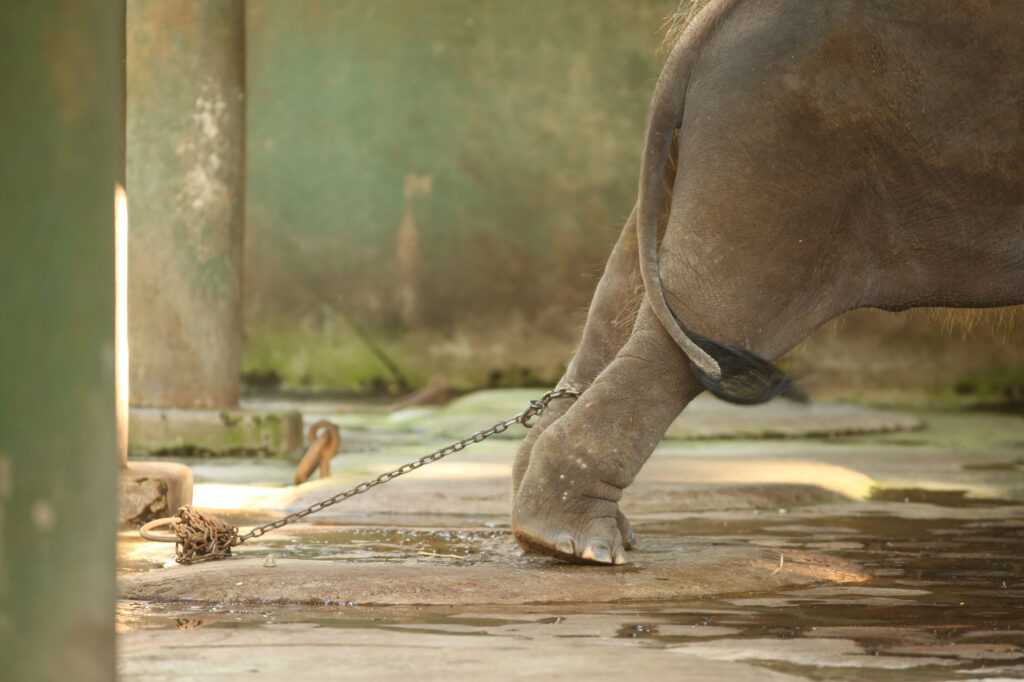Chained and alone no way to treat this gently giant
Bandra’s Story
“There is no creature among all the Beasts of the world which hath so great and ample demonstration of the power and wisdom of Almighty God as the Elephant.” — Edward Topsell.
What an excellent statement about these gentle giants.
Elephants are the world’s largest living land animals. Adult African males can weigh up to 6,800 kilograms (15,000 pounds). The only living animals bigger than elephants are whales.
Elephants can also live as long as humans, with Asian elephants living into their 80s.
Bandra’s Sad Tale Begins
I was on a work assignment auditing a company in Brunei. As is often the case in these audits, there is a strong social element. Asian folks like to make you feel welcome.
My host for the day was very proud of her country. She took me to visit sites, including a deserted theme park. Well, it was not really deserted, it was owned by one of the wealthy Brunei royal family.
On days when he fancied, he would open up the park and pay vendors to run the rides and sideshows to entertain his friends.
We were walking through the park to get to a place where we were going to have lunch when we came across an enclosure with one tree in the middle and a lonely-looking elephant.
I swear she was crying!
She told me her name was Bandra. i asked her why she was chained to the tree by herself.
Her reply sickened me.
She said she was a ‘pet’ of one of the royal children but had tried to get out of his enclosure, so they had chained him to the tree.
All she had was the tree and a tub of water.
Big feet, Big Hearts
Elephants can hear through their feet, detecting vibrations in the earth. They decipher secret underground messages between one another using mechano-receptors in their feet and toes that are very sensitive to vibrations.
They produce a range of vocalizations, from trumpets and barks to many types of rumbles. These rumbles are low-frequency sounds that not only vary greatly but can travel through the ground and last anywhere from half a second to 12 seconds.
Researchers have found that elephants can address others with specific vocalisations or names. They found that in response to certain key sounds (rumbles, trumpets, and other noises beyond our hearing range), only one or several other elephants will respond, depending on the tone and sound.
Elephants’ social dynamics are very structured. Herds are dominated by the oldest female (the ‘matriarch’) and consist of mothers, their young sisters, aunts, and grandmothers. On occasions, they change herds during the day and rejoin their original family at night.
Males usually hang out with other blokes in separate ‘bachelor groups.’
Among the most sensitive wildlife species, they show compassion, self-awareness, and grief, recognising and responding to other elephants’ pain and sadness.
For instance, when a herd member is injured, the rest will walk more slowly to ensure they can keep up. Elephants have also been observed lifting injured and sick individuals with their trunks and tusks and making distress calls.
Most importantly, going back to Bandra, they need company. Much of an elephant’s brain stimulation in the wild comes from other elephants. Constantly moving—listening, sniffing, playing—solitary captive elephants do not move or sniff; they stand still.
Bandra was as depressed as an elephant could be – just standing there, robbed of social interaction and any form of stimulation.
Compassion is their middle name
Elephants are also among the most empathetic animals alive. Non-birth mothers will protect elephant calves from danger by chasing away predators or stopping aggressive play fighting.
Known to grieve and mourn their dead, elephants often visit carcasses repeatedly. They spend varying amounts of time with the bodies, exhibiting behaviours beyond curiosity, such as standing with inactive trunks in an almost reverend way much like a human at a funeral.
When encountering the remains of a deceased elephant, they stop and observe them silently, often smelling and touching the bones with their trunks.
If an elephant calf loses its mother before the age of two, it will likely not survive. A six-month-old African calf was seen nuzzling her mother’s carcass, wandering around confused, and returning to the carcass. Tragically, the calf was presumed dead within three months.
They have a sense of compassion extending beyond their own kind and can extend to other species in distress. They help one another in adversity and miss absent loved ones. When you know them well, you can see that they even smile when having fun and are happy.
Burials are rare in the animal kingdom. Both African and Asian elephants cover their dead with foliage. In 2022 and 2023, different herds were seen dragging their deceased babies to irrigation ditches in India’s northern Bengal region and burying them there.
In all cases, researchers found the calves’ legs sticking up from the ground, with their heads, trunks, and backs covered with soil.
Back to Bandra
We estimated that Bandra was still a young elephant, 5–10 years at most. Clearly, she was undernourished and deprived of social contact, be it with other elephants or even humans, that she needed to make her life complete.
Instead, she had been punished for trying to ‘find a life.’
I wanted to jump the fence and chew off her chain. It was one of the most depressing sites I have seen.
We do so much harm
Sadly, I am sure there are many more like Bandra worldwide.
Mankind continues to abuse these beautiful animals. We chain them up and subject them to unnatural acts in circuses and keep them as solitary animals in zoos.
If that is not enough, poachers persecute them for the illegal ivory trade. Every year, poachers kill over 25,00 elephants, making them among the most endangered animals on the planet.
It is estimated that every day 100 elephants are killed illegally in Africa to feed an insatiable demand for ivory, principally from Asia. This kill rate exceeds the birth rate—a trend that, if not reversed, inevitably leads to extinction.
Will we ever learn to respect the wonderful creatures of this world (and I don’t include humans in that pot)?
Till next time,
Calvin


3 thoughts on “EINADW #15: The Day the Crying Elephant Broke My Heart”
Very moving Calvin, and so true.
Jill and I observed this familial behaviour on our 2 trips to Africa some years ago. Cheers ian
Oh, this is such a sad story. I wonder if Bandra is still there, tied to that tree and alone? 😢
We can only hope that she was freed of her loneliness and maybe sent somewhere where she had some friends.
Comments are closed.